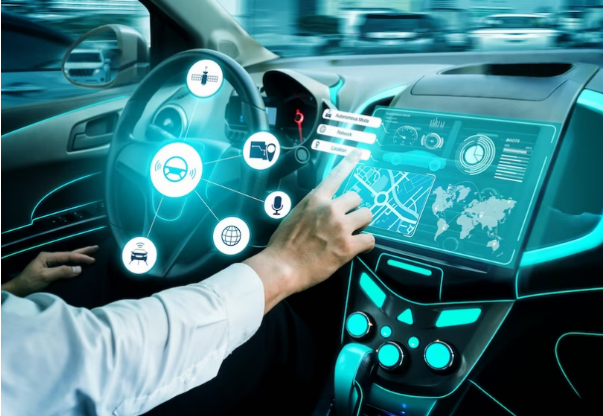To improve security in increasingly connected cars, automakers are looking at blockchain technology, which is famous for being used in cryptocurrencies like Bitcoin. As the ordinary automobile moves closer to becoming fully connected, electric, and autonomous, there will be a greater need for a more sophisticated database, and blockchain is the answer.
What Is a Blockchain and How Does it Work?
Instead of being linked to a central processor, a blockchain is a distributed database that maintains track of an expanding collection of ordered documents known as blocks. Each block has a timestamp and a link to a block before it. Thus changing one block always changes the blocks behind it as well. By possessing the necessary private keys to write to the file, users can change the parts of the blockchain they “own.” Cryptography keeps everyone’s copies of the distributed blockchain in sync.
Blockchains are excellent options for storing data for identity management, medical records, financial transactions, and provenance since they are secure databases by nature. Blockchain can eliminate intermediaries in the processing and exchange of transactions.
How Blockchain is Impacting the Automotive Industry?
The automobile industry has altered and been influenced by blockchain in the following five ways:
Secure In-Vehicle Payment
The main uses of blockchain technology, which is how it was first popularized, still revolve around Bitcoin and other cryptocurrencies. However, blockchain technology will someday allow car owners to pay for the power required to charge their electric cars. Imagine that every time you set up your automobile, a smart contract on the blockchain is triggered, taking the appropriate funds out of your account and transferring them to the charging station. You might use the same argument with your auto insurance, monthly parking charge, and other financial arrangements.
Safeguarded Autonomous Data
When a self-driving automobile travels globally, the voyage details may be stored on the blockchain. The issues this localization data covers vary widely, from road and infrastructure details to typical traffic patterns. Other vehicles in the network will be able to access this data once it has been verified and stored in a block and can be confident that it has been processed using blockchain technology, making it accurate and secure (adding to, removing from, or changing data is nearly impossible once it has been validated and stored in a block).
Sharing everyone else’s data is the shortest path to autonomous driving. Therefore automakers may soon employ blockchain to share all the localization data as securely as possible. Only those with the proper authorization would have real-time access to this data, which is cryptographically safeguarded. Even though it is less dangerous for individuals than OEMs, hacking is a booming business. Blockchain technology prevents “bad actors” from taking over the network and maybe holding OEMs hostage by demonstrating what can be done to the automaker’s autonomous car network.
Decentralized Ridesharing
Ride-hailing services like Lyft and Uber are already reinventing how we use — or don’t use — our automobiles. With only a few clicks on an app, you may be picked up in a vehicle and taken to your destination. Ridesharing may evolve due to blockchain technology, autonomous technology, and the many blockchain development companies operating globally. If you happen to live in any American city, it’s more than a coincidence that you are there. It becomes simple for you to contribute swings to blockchain development companies in USA in such a situation.
One of the objectives of blockchain technology is to eliminate intermediaries between passengers and drivers while allowing more secure data maintenance. Drivers will get money once they have successfully transported a passenger to their destination by embedding payment terms into a smart contract. The contract may release minimal cash to the driver to reimburse their time instead of imposing an arbitrary cancellation charge.
Blockchain technology can transform how companies like Uber do business. Transferring the payment and driver/rider selection procedures to the independent, secure blockchain may eliminate the intermediary and build an ecosystem-type platform. Riders may connect with drivers online, learn about their reputations, and choose a driver based on cost, quality, and other free-market considerations. It would be a welcome option for many drivers who are unhappy with the current ridesharing remuneration system associated with companies like Uber.
Fair and Reliable Car Sharing
Sharing transportation and automobile ownership is conceivable because of blockchain-based systems. Instead of everyone living in a highrise having a car or depending on other modes of transportation, a group of people may transfer ownership of a fleet of ten automobiles in the future. The automobiles’ blockchain would maintain an account of each vehicle’s use during that period, and users would use an app to request vehicle access when needed.
The system would settle payments automatically by the conditions decided upon by the owners. The exact duration, distance, and speed of a vehicle’s usage would no longer be in doubt due to blockchain’s security, which would eventually lead to improved convenience for everyone.
Supply Chain Management
The transparency provided by distributed ledger technology helps the automotive industry ensure that suppliers, shippers, and manufacturers all see the same supply chain, preventing the insertion of bogus components. Several blockchains might also be used to handle the massive volumes of data suppliers and manufacturers of automobiles produce and analyze regularly.
For instance, one blockchain may preserve quality inspection documents throughout the manufacturing process, another would keep bills of lading for car components, and a third might save WIP data for each vehicle assembly from start to finish.
Smart contracts may also be used in industrial blockchains to automatically release purchase orders at certain points in the production process. Supply chains may profit from agreements automatically granted to suppliers with the greatest inventory.
The Opportunities Seem Endless
Since blockchain is a specific and unique encryption, it could be one of the main technologies that help the automotive sector evolve into the new age of smart automobiles. Blockchain technology can fundamentally alter how data is managed in future automobiles, whether by bettering shared ownership or protecting financial data. An AI software development company plays a crucial role in harnessing the power of blockchain and developing innovative solutions for the automotive industry.








